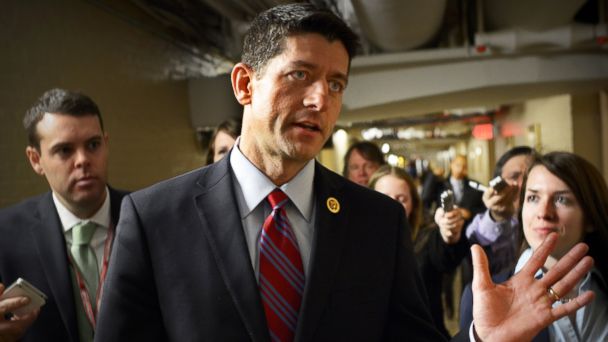Paul Ryan Says Presidential Ambitions Not Derailed by Budget Deal

Bill O'Leary/The Washington Post/Getty Images
Paul Ryan, the House Budget chairman and architect of the bipartisan budget deal, dismissed criticism from Tea Party groups and conservative activists who suggested his political ambitions would be tainted by the bill that passed the House on Thursday night by a wide majority.
"People always say, 'Well this could hurt you with your future ambitions,'" Ryan told ABC News. "If I'm not good at this job, why should I ask somebody for another job?"
Ryan, who has been one of the party's leading voices of conservative fiscal policy and was the GOP vice presidential nominee last year, forcefully defended the budget accord. He said it was short-sighted for other potential Republican presidential candidates to assail the agreement,
"My job is not to cloud my judgment with personal ambition. My job is to do my job and that is things like this," Ryan told ABC News. "If I have to stop myself from doing what I think is right to become president, then I don't want to be president."
In an interview, Ryan raised his presidential ambitions without being prompted or directly questioned about them. When asked whether he was seriously considering being a candidate in 2016 or beyond, he declared, "I will think about it. It's in the back of my mind."
"But for all these people who say I'm hurting my political ambitions," Ryan said, "that's just not my concern."
The budget agreement, which passed by an overwhelming vote of 332-94 in the House, has fanned the flames of an internal civil war in the Republican Party. Tea Party groups and conservative activists were sharply critical of the bill and it faces significant criticism in the Senate, which takes up the bill next week.
Ryan urged Republicans in the Senate to study the bill, which contains several government reform measures to save money, from a Medicaid overhaul that saves $1.4 billion to government pension changes to save $6 billion over 10 years.
"I wouldn't say it's big in numbers. It's big in symbolism," Ryan said. "This is the first time, with a divided Congress, that we've had a budget agreement since 1986 when both Houses were controlled by the other parties."
Passing the budget agreement, Ryan said, was the biggest sign yet that Republicans have learned at least one political lesson from the government shutdown: No more shutdowns next year.
"We don't think government shutdowns are a good idea," Ryan said. "What this budget does, this agreement, it prevents a possible shutdown in January and then it prevents another possible shutdown in October."
The budget accord, which Ryan reached after long negotiations with Patty Murray, the Democratic chairwoman of the Senate Budget Committee, could well emerge as the biggest achievement of a Congressional year filled with rancor. He pushed back against criticism from some conservatives that he compromised too much on the deal.
"You're not always going to get what you want every time in divided government," Ryan said. "You know you have to, you have to make some common ground decisions to get things done."